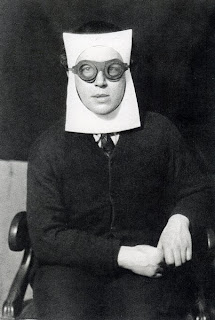 The lychgate of a field showed Father Conmee breadths of cabbages, curtseying to him with ample underleaves. The sky showed him a flock of small white clouds going slowly down the wind.
The lychgate of a field showed Father Conmee breadths of cabbages, curtseying to him with ample underleaves. The sky showed him a flock of small white clouds going slowly down the wind.
James Joyce, Ulysses (1922), Wandering Rocks
 Мокрая осень летела над Петербургом; и невесело так мерцал сентябревский денек. Зеленоватым роем проносились там облачные клоки; они сгущались в желтоватый дым, припадающий к крышам угрозою. (Sodden autumn was flying over Petersburg; and joylessly gleamed the September day. Thence cloud-tatters were borne in a greenish swarm; they congealed into a yellowish smoke, tumbling down to the rooftops threat-wise.)
Мокрая осень летела над Петербургом; и невесело так мерцал сентябревский денек. Зеленоватым роем проносились там облачные клоки; они сгущались в желтоватый дым, припадающий к крышам угрозою. (Sodden autumn was flying over Petersburg; and joylessly gleamed the September day. Thence cloud-tatters were borne in a greenish swarm; they congealed into a yellowish smoke, tumbling down to the rooftops threat-wise.)
Andrei Bely, Petersburg (1913), A Wet Autumn
 The wind began to moan in hollow murmurs, as the sun went down carrying glad day elsewhere; and a train of dull clouds coming up against it menaced thunder and lightning. Large drops of rain soon began to fall, and, as the storm clouds came sailing onward, others supplied the void they left behind and spread over all the sky.
The wind began to moan in hollow murmurs, as the sun went down carrying glad day elsewhere; and a train of dull clouds coming up against it menaced thunder and lightning. Large drops of rain soon began to fall, and, as the storm clouds came sailing onward, others supplied the void they left behind and spread over all the sky.
Charles Dickens, The Old Curiosity Shop (1841), Chapter 29
 Небо было ужасно темное, но явно можно было различить разорванные облака, а между ними бездонные черные пятна. Вдруг я заметил в одном из этих пятен звездочку и стал пристально глядеть на нее. Это потому, что эта звездочка дала мне мысль: я положил в эту ночь убить себя. (The sky was frightfully dark, but it was possible to descry the ragged clouds clearly, and between them bottomless black spots. All of a sudden I noticed in one of these spots a little star and I began to stare at it fixedly. That was because the little star gave me an idea: I decided to kill myself that very night.)
Небо было ужасно темное, но явно можно было различить разорванные облака, а между ними бездонные черные пятна. Вдруг я заметил в одном из этих пятен звездочку и стал пристально глядеть на нее. Это потому, что эта звездочка дала мне мысль: я положил в эту ночь убить себя. (The sky was frightfully dark, but it was possible to descry the ragged clouds clearly, and between them bottomless black spots. All of a sudden I noticed in one of these spots a little star and I began to stare at it fixedly. That was because the little star gave me an idea: I decided to kill myself that very night.)
Fyodor Dostoevsky, The Dream of a Ridiculous Man (1877)
 Становилось все темнее. Туча залила уже полнеба, стремясь к Ершалаиму, белые кипящие облака неслись впереди наполненной черной влагой и огнем тучи. Сверкнуло и ударило над самым холмом. (It was growing ever darker. Nearing Jerusalem, the cloud had already flooded half the sky. Seething white billows raced ahead of the cloud saturated with black moisture and flame.)
Становилось все темнее. Туча залила уже полнеба, стремясь к Ершалаиму, белые кипящие облака неслись впереди наполненной черной влагой и огнем тучи. Сверкнуло и ударило над самым холмом. (It was growing ever darker. Nearing Jerusalem, the cloud had already flooded half the sky. Seething white billows raced ahead of the cloud saturated with black moisture and flame.)
Mikhail Bulgakov, Master and Margarita (1931-1940), Chapter 16 'The Execution'

It was principally for these reasons that Watt would have been glad to hear Erskine’s voice, wrapping up safe in words the kitchen space, the extraordinary newel-lamp, the stairs that were never the same and of which even the number of steps seemed to vary, from day to day, and from night to morning, and many other things in the house, and the bushes without and other garden growths, that so often prevented Watt from taking the air, even on the finest day, so that he grew pale, and constipated, and even the light as it came and went and the clouds that climbed the sky, now slow, now rapid, and generally from west to east, or sank down towards the earth on the other side, for the clouds seen from Mr. Knott’s premises were not quite the clouds that Watt was used to, and Watt had a great experience of clouds, and could distinguish the various sorts, the cirrhus, the stratus, the cumulus and the various other sorts, at a glance.
Samuel Beckett, Watt (1953)
 There might be a line of spaced trees silhouetted against the horizon, and hot still noons above a wilderness of clover, and Claude Lorrain clouds inscribed remotely into misty azure with only their cumulus part conspicuous against the neutral swoon of the background.
There might be a line of spaced trees silhouetted against the horizon, and hot still noons above a wilderness of clover, and Claude Lorrain clouds inscribed remotely into misty azure with only their cumulus part conspicuous against the neutral swoon of the background.
Vladimir Nabokov, Lolita (1955)

A fitful light was breaking through the clouds, and the arches circumscribing the quadrangle cast pale shadows that weakened or intensified as the clouds stole across the sun.
Mervyn Peake, Titus Groan (1946), 'The Sun Goes down Again'








































.jpg)





























